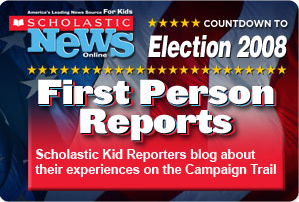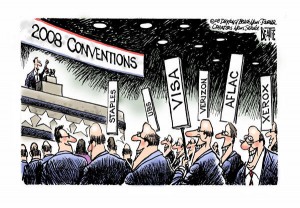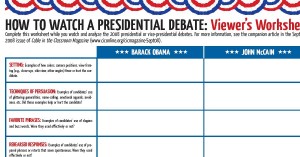Aug. 22, 2016 Update Excellent post by Diana Graber at Cyberwise “What to Tell Kids When Adults Behave Badly” which sadly validates, via Southern Poverty Law Center, how we’ve unraveled 15 years of anti-bullying education in schools with the crass, raunchy bluster of our current political climate.
See “The Trump Effect: The Impact of the Presidential Campaign on our Nation’s Schools. The disinformation and propaganda are startling and surreal. We MUST make this a priority to reverse the damage adults are doing as a culture, as a society, as a nation to the next generation of kids.
Aug. 15, 2016 Update In prior Presidential campaign years, I’ve written about using fun resources to engage kids in elections, from favorites like iCivics games, “conflict of interest bingo” and spin-spotting the debates, to “Kids Pick the President” Nickelodeon simulations, Scholastic election student coverage, Time for Kids microsites and elaborate civics curriculum and simulations taking place in virtual worlds to instill digital citizenship…
In 2016, resource round-ups like Education World’s school year civics tips continue to boost important government conversations, but somehow in 2016 the opportunity to uncork dialogue feels very different.
It would behoove educators to add a hefty wallop of CyberCivics and digital citizenship from our partner org Cyberwise to be taught in tandem with any 2016 campaign conversation as it’s imperative to not just ‘educate’ but elevate civility, instead of tearing it to shreds.
Students need help making sense of this hot mess! Here’s a Common Sense Media video to jumpstart the decoding of the 2016 election with the basics. Most disturbingly:
The signal to noise decibel level is so piercingly surreal in rhetoric, deception, and Trumpian tidbits of racial slurs and stereotypes that the ‘life lessons’ smack discordantly against anti-bullying school policies themselves!
2016: Year of Adults Behaving Badly
In the tradition of fall fashion magazine “don’ts” this entire election exemplifies a massive “don’t do this” media magazine spread. Fast Company asks,
“Have politics become so ugly that teachers are afraid to teach civics?”
Seems “teaching moments” about the stage-crafting of politics will sharpen children’s critical thinking skills now more than ever…But for the first time, the lens should zoom out beyond micro-aggressions and ‘reality TV’ news cycles baiting outrage for entertainment ratings and instead focus on the MACRO impact and grave implications of a voting public fueled on lies and very deliberate disinformation.
Students can receive profound history lessons on the consequences of inciting crowd-violence with rowdy rhetoric and ‘just kidding’ recklessness (again, more prior precedents with Rabin in Israel of yesteryear) as well as the cultural climate and the toll it takes when bullying and bluster hits a nation like a cyclone of propaganda at fevered pitch.
This is not “red or blue states,” it’s purple…
Purple as in…bruises. Great big nasty national ones.
Those who have doggedly tried to shield kids from raunch culture and “humiliation as sport” should find it particularly ironic that the most divisive, racist, name-calling blather to ever come over the airwaves is now pitifully spewed to vie for the highest office in the land. It’s “unrated” content and unsuitable by any calibration, especially given megabucks spent on anti-bullying programs in schools used to instill a culture of civility, torn down (ok, shredded) by the ignorant blather of showboating snakes.
“Teach your children well’…this is not a red state or blue state dust up…it’s a blend of deep purple damage, with bruises and scar tissue that has hurt this country’s reputation and respect, long-lasting wounds far beyond global ridicule. I hope kids educate themselves on the don’ts…apply them well, and create their own role models this year. Adults have failed students miserably this election cycle.
 Original post: Sept. 4, 2008 “Neither left, nor right, but forward” is my ‘mama-media’ mantra in trying to impart the critical thinking skills necessary to make sense of historic election hoopla on all sides of the campaign circus.
Original post: Sept. 4, 2008 “Neither left, nor right, but forward” is my ‘mama-media’ mantra in trying to impart the critical thinking skills necessary to make sense of historic election hoopla on all sides of the campaign circus.
As media trots out all the historic ‘firsts’ (first black, first female, first youth civic engagement en masse) the filters and niche-marketed spins make many eyes roll skyward, especially among those of us in the non-partisan realm. How can we help kids to question assumptions and ‘stage-crafting’ when fun digital magic of Web 2.0 allows us to add our OWN name candidacy in believable bumper-sticker mode? What is ‘real?’ Or is it EVER?
With virtual petitioning ‘in-world’, mock-classroom elections, using mobile to mobilize, Scholastic Kid Reporters blogging, Nickelodeon kids voting, GovTweets twittering, and Facebook “widgets, and buttons and apps, oh, my!” it’s useful for folding into our “collective knowledge depository” as dear digital genius and pal Doug Engelbart might say. But sorting out the dynamics is another task!
Thankfully, colleague Frank Baker is helping educators and kids alike do just that, with his jam-packed link list of helpful resources compiled on his site, Media Literacy Clearinghouse. Frank Baker also has a fabulous article in this month’s Cable In The Classroom magazine called, “Lights, Camera, Debate: How to Watch the Presidential Debates from a Media Literacy Perspective.”
Who PAYS for the conventions and what influence might they have?
(The priceless cartoon at left is by Bruce Beatie of the Daytona Beach News-Journal) as seen on Frank Baker’s “Teaching the Conventions” site.
How should kids watch these extravaganzas with an ear and an eye toward who and what gets shown, heard, covered, amped, and spun into the web of social media? And moreover, how can we best teach kids to be aware of what doesn’t snare the spotlight? How can we begin to impart the concept of ‘what sells’ and propaganda?
 There’s even a companion worksheet you can print out labeled Web Extra right below Frank’s article which looks like a ‘scorecard’ for kids to write-in favorite phrases and techniques of persuasion, glittering generalities, observations of rehearsed responses, camera cutaways, nonverbal language and expression, setting, pundit challenges and more.
There’s even a companion worksheet you can print out labeled Web Extra right below Frank’s article which looks like a ‘scorecard’ for kids to write-in favorite phrases and techniques of persuasion, glittering generalities, observations of rehearsed responses, camera cutaways, nonverbal language and expression, setting, pundit challenges and more.
Frank’s links are solid, his tips are gold, and his spirit of “helping make sense of it all” is sublime. He also has an entire guide on deconstructing Political Campaigns & Advertising to “spot the spin”…I’ve got a virtual world project that might bring together a confluence of these election/civic ideas to test in a beta opportunity, seeding tween media literacy in the governmental process…so heads up, media literacy folks, I’ll be making some phone calls soon. Frank, you’re one of ‘em.
Dr. Renee Hobbs, Sherri Hope-Culver, Kelly Mendoza, and the gang at Media Education Lab (of My Pop Studio acclaim) have joined with PBS Teachers online in a project called: “Access, Analyze, Act: A Blueprint for 21st Century Media Engagement”
It’s a very cool Web 2.0 way to make the elections relevant to teens tapping into their everyday life and social media skills. They’ve developed a free, online curriculum for middle to high schoolers (grade 7-12) to leverage the internet for engaging in political blogs, interactive quizzes, podcasts and web-based widgets…
“You can learn about issues and candidates with Ballotvox, Budget Hero, and You Decide. Track the candidates’ progress with Interactive Maps. Find out how your views align with those of the candidates using Select a Candidate and the Vote by Issue Quiz. Look up your lawmakers and track their key votes via mail.”
Love it. In fact, any students that want to cross-post your findings on Shaping Youth, drop a comment on the blog and I’ll get back to you. This could be a fun, effective manner to take the pulse of youth ongoing, as we begin to form our fall school year teen teams and special correspondents. Put your name in the hat!
We’re also looking for anyone currently on the floor at the debates/conventions/townhalls to cover your experiences. (parent/child duo would be ideal, so any of you Scholastic kids or blogger teens, ping me!)
We have a father/son team reporting on impressions from the Democratic National Convention in Denver, offering a ‘green scene’ report card along with a gonzo journalism approach to scripted and choreographed moments, juxtaposed with free-flowing emotion, ideas and ideals. Heady stuff. Some hilarious. Some poignant. Very ‘Hunter S. Thompson’ in observational style…Fun!
Now we’d like to get the same take on the GOP, to stay balanced, so reader Charlie on the PA Turnpike, perhaps you and your son would like to take on the convention analysis in a guest post for us too? If not, anyone else? We have tons of readers in Minneapolis according to our analytics, so SOMEone must be there ready and willing to offer an ‘up close and personal’ point of view? Or just on the tube coverage itself? Do let me know…
Related Resources
How Stuff Works: Political Conventions
Shaping Youth: Project Vote Smart: Youth Hub for Critical Thinking Skills
TechPresident (2016 update the Civicist)
Personal Democracy Forum: Technology is changing politics
Shaping Youth: Will Kids Pick the President?
Media Simulations Where Kids Cast Their Vote: Silly or Sage?
Shaping Youth: GovTweets: A Snapshot of Election Dialogue
Shaping Youth: Did Jott the Vote Decide to Move On?
Shaping Youth: Using Mobile to Mobilize: Tapping Into Youth Info Needs
2016: Frank W. Baker’s Media & Politics Page
(2016 New/Revised Links below)
Decoding The Ads: Emotions That Drive Voter Decisions
Ideas/Activities for Teaching Election 2016
ComingSoon–> How To Watch & Analyze The Fall 2016 Presidential Debates
History of Political Advertising (infographic)
Track TV Ads in The 2016 Presidential Campaign
Everything You Need to Know About Political Advertising
Who’s Winning The Money Race
Broadcasters Want Campaigns to Buy More Ads
Are Instagram Attacks Ads The Future of Politics?










In addition to Frank Baker’s article in Cable in the Classroom Magazine, our website has some media literacy/elections resources looking at how events are staged and how political advertising works. http://www.ciconline.org/takechargeTVvideoclips
Kids and families may also enjoy the online election game, http://www.ciconline.org/elections
Kee up the great work.